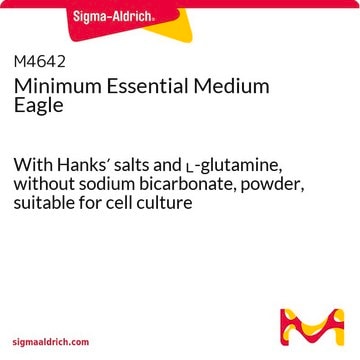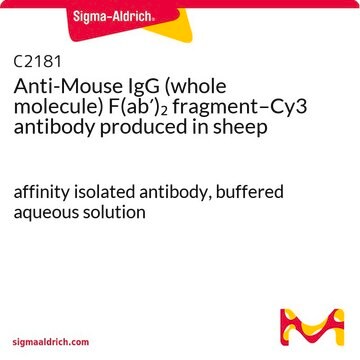M0644
Minimum Essential Medium Eagle
Alpha Modification, with L-glutamine, ribonucleosides and deoxyribonucleosides, without sodium bicarbonate, powder, suitable for cell culture
Synonym(s):
MEM
About This Item
Recommended Products
Quality Level
form
powder
technique(s)
cell culture | mammalian: suitable
components
NaHCO3: no
L-glutamine: yes
phenol red: yes
HEPES: no
sodium pyruvate: yes
shipped in
ambient
storage temp.
2-8°C
Looking for similar products? Visit Product Comparison Guide
General description
Application
- maintain natural killer (NK) cell lines
- culture Leishmania donovani strains
- culture epidermal neural crest stem cells (EPI-NCSCs) from the bulge of rat hair follicles
Quantity
Reconstitution
also commonly purchased with this product
Signal Word
Warning
Hazard Statements
Precautionary Statements
Hazard Classifications
Skin Sens. 1
Storage Class Code
11 - Combustible Solids
WGK
WGK 1
Flash Point(F)
Not applicable
Flash Point(C)
Not applicable
Choose from one of the most recent versions:
Certificates of Analysis (COA)
Don't see the Right Version?
If you require a particular version, you can look up a specific certificate by the Lot or Batch number.
Already Own This Product?
Find documentation for the products that you have recently purchased in the Document Library.
Customers Also Viewed
Articles
A large selection of MEM formulations. Minimum Essential Medium (MEM), developed by Harry Eagle, is one of the most widely used of all synthetic cell culture media.
A large selection of MEM formulations. Minimum Essential Medium (MEM), developed by Harry Eagle, is one of the most widely used of all synthetic cell culture media.
A large selection of MEM formulations. Minimum Essential Medium (MEM), developed by Harry Eagle, is one of the most widely used of all synthetic cell culture media.
A large selection of MEM formulations. Minimum Essential Medium (MEM), developed by Harry Eagle, is one of the most widely used of all synthetic cell culture media.
Protocols
Powdered media and salt mixtures are extremely hygroscopic and should be protected from atmospheric moisture.
Our team of scientists has experience in all areas of research including Life Science, Material Science, Chemical Synthesis, Chromatography, Analytical and many others.
Contact Technical Service





